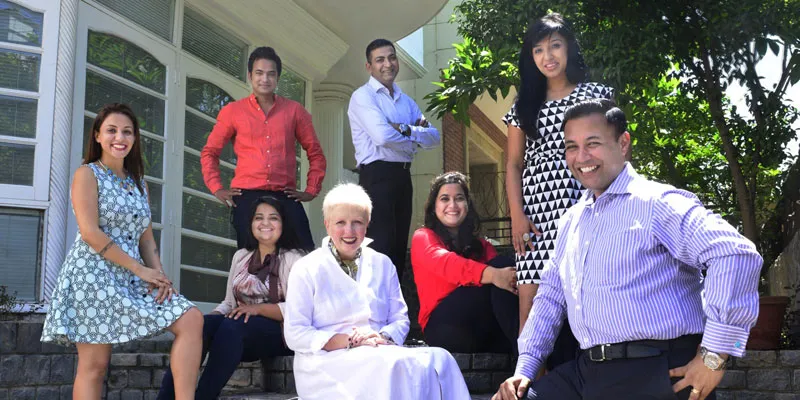How EazyDiner is creating a niche in a space dominated by biggies like Zomato
At a startup event recently, a top entrepreneur was heard saying that most startups in India are merely using technology to reinforce age-old habits. Indians have always found others to do their chores for them -- be it repairing a leaky pipe or doing the laundry. DIY is a three-letter word best left out of conversations. How else would you explain the home run that the hyperlocal sector is enjoying at the moment?

But what happens when you first have to change mindsets before you build a business? The very customer whom you are trying to woo does not see any reason why they should change their old ways just so that you have your minimum viable product to show.
When Singapore-based Deepak Shahdadpuri, Managing Director of DSG Consumer Partners, would visit India he’d be at pains to be able to book a table at his favourite-and-always-packed restaurant Bukhara in Delhi. “It would really be frustrating not to get a table in a restaurant where I wanted to dine. No one here was used to booking a table,” he tells YourStory over the phone. Being an early stage investor, Deepak smelt an opportunity in the reservations space.
Universally, every country has the culture of booking a table at a restaurant. Even the South East Asian neighbourhood, especially Singapore and Hong Kong, enjoys the culture of reserving a table before dining out. It is a matter of time before India follows.
Culture shift
But how do you change a market and in turn the consumer mindset. “Incentivise it,” replies Deepak. So for every booking you make via EazyDiner, the company that Deepak financed, you get a deal.
Adds Vir Sanghvi, leading food critic and Co-founder of EazyDiner,
You cannot change the consumer mindset unless there is something in it for them. Would you rather go to a restaurant and take your chance or book with EazyDiner even an hour earlier and get a free glass of wine, a free desert or discount on your meal? We do not just guarantee a table but also something that will give you a deal. As our slogan says ‘no meal without a deal'.

Founded in 2014, EazyDiner is India’s first online restaurant reservation platform curated by Vir Sanghvi and others with past experience in the hospitality industry. Earlier launched as a concierge service, users can now book instantly through their app as well. It provides short concise reviews, finds restaurants and bars, and makes online reservations within 30 seconds. EazyDiner lists over 19,000 restaurants and bars at over 500 partner restaurants in Delhi-NCR and Mumbai.
In a recent development last week, EazyDiner raised $3 million Series A co-led by existing investor DSG Consumer Partners and new investor Saama Capital. Saama Capital’s current investments include Snapdeal and Paytm while DSGCP has backed Oyo Rooms, Zipdial and Mswipe. Last July, DSGCP and Gulpreet Kohli, former MD of Chrys Capital, also invested a seed round of $1 million.
The startup will invest heavily in expanding to other cities starting with Pune after Mumbai and Delhi. “By the end of this year we will be available in Bengaluru as well,” says Vir. He says they are eventually looking at going to Chennai, Kolkata, Dubai and some South East Asian cities.
Giving the biggies a slip
“I always thought Zomato will enter this space and hence waited and watched for the space to be occupied,” says Deepak. When he did not see any such movement, he approached Vir, because of his influence in the media and hospitality space, to take up the challenge.
At that point in time, India was also witnessing a shift from tablets and computers to smartphones, hence when one is using a computer and one sees 125 user reviews one is willing to go through them, but on the smartphone one has only limited space on the screen and one just wants a quick review that says it all, he informs. “So we thought curated content will work, which does not mean that user-generated review is not available on our site,” adds Vir.
According to him, though Zomato is not in the curated review space but in the user generated content space, it still is one of their biggest competitors. Says Vir,
They are getting into bookings, but it is a very small part of their total enterprise, they are now focusing their energies in the food delivery space. So yes, they are our competition but they are not really in the same game. There are many big guerillas in the room, fortunately for us they are sticking to other corners of the room. In our little corner there’s isn’t anybody else. The booking space is largely open.
When they started out it was mainly concierge booking. “But there is a whole new generation of Indians, the Uber generation, for want of a better word, that goes to the site sees the review and books immediately. So in a sense, smartphones may well change the mindsets when it comes to the Uber-like bookings,” feels Vir.
On the growth path
Deepak feels in the next five to 10 years, we will definitely see a shift in the consumer behaviour as far as reservation space in India is concerned.
DSGCP has been actively looking at the restaurant reservation space in Asia for three years, as they believe this will be a very large opportunity. In South East Asia, they have backed Chope, the Singapore-based market leader. “I was trying to solve a problem I was facing and which I knew many others were – why can I not book a table online or on an app just like I book a hotel, flight, or taxi. So we brought together a team of like-minded and passionate professionals to build a product and pilot it in Delhi NCR. We have learnt a lot from this pilot and continue to learn and improve the product, but I am more convinced now than ever that this is a huge opportunity,” says Deepak.
Besides Vir, the EazyDiner team comprises Ahana Bhutani, Vice President, Bengaluru, Ruchika Dhamija, Chief Product Officer, Manish Kutaula, Chief Architect – IT, Sue Retiz, Managing Director and Co-Founder, Sachin Pabreja, Vice President – Sales, Shruti Kaul, Vice President – Alliances and Acquisitions, Mausumi Barooah, Vice President, Mumbai, and Rohit Dasgupta, Sr. Vice President. Since its launch in Delhi earlier this year in January, it has grown 25 times in the last seven months and will book 10,000 diners in August alone, up from the 400 diners in January.
Vir’s challenges
According to Vir, while it is easy to say that the restaurants industry welcomes the idea of booking, what you are really telling the restaurants, particularly the hotel restaurants, is that for every guest I send you I want Rs 150, so restaurants are not open to paying up for customers. It is a bit of a challenge to get them on board. Moreover, the site only works if it is difficult to get a table in a restaurant. The restaurants claim if I am booked out for the next few weeks why should I need you to get customers? He says,
We have to persuade them. We say think long term, and how eventually technology will take over. It was a tough process to get the restaurants on board even though most of us are from that space. It took us a year to get started.
Commenting on the vibrant startup scene in India, Vir says there is enormous excitement. “I like the sense of empowerment that startups give the young people. You no longer have to work in a corporate organization; you can live your dreams and use your ideas to start your own business. Technology has empowered a whole new generation.”
4 things about dining out in India
According to Vir, whose favourite places to dine out in Delhi are Bukhara and Indian Accent and in Mumbai, Konkan Café and Bombay Canteen, the Indian diner is becoming adventurous. When it comes to dining out, his observations are that:
- Indians can surprise you, besides Indian and Chinese cuisine, the most successful cuisine in India is Japanese, given the fact that it is non-spicy and has raw fish on the menu.
- The younger generation is rejecting heavy, oil-laden food. Places like Indian Accent and Bombay Canteen are drawing from home kitchen recipes to give young people food which is light and wholesome.
- There is a sense of adventure as far as dining out is concerned. People are looking beyond the butter chicken, naan variety. Places like Farzi Café in Gurgaon exude a sense of fun and coolness.
- Formal dining as we know it is on its way out. India is the only place where restaurants do not expect you to wear a jacket.







